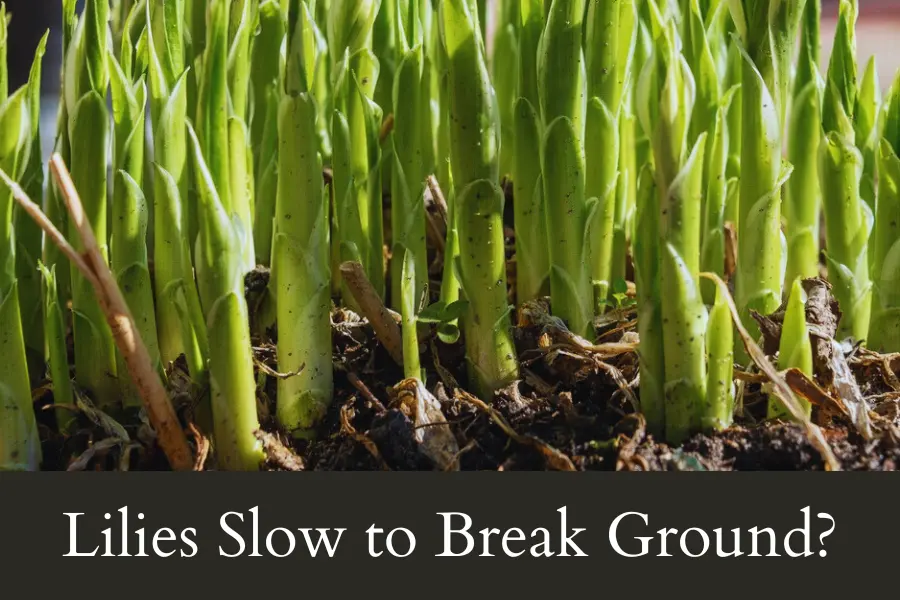Lilies Slow to Break Ground? Here’s Why and How to Fix It!
Are your lilies slow to break ground? Don’t worry, this is a common issue with several easy-to-understand reasons. Sometimes it’s the weather, soil, or how you planted the bulbs.
In this guide, I’ll explain what might be slowing them down and how to help them sprout faster. Stick with me, and I’ll walk you through everything you need to know!
Key Points
- Lilies might be slow to sprout due to cold soil.
- Planting lilies too deep can delay their growth.
- Poor soil quality can make it harder for lilies to break ground.
- Lack of sunlight can slow down sprouting.
- Warming the soil and replanting bulbs can speed up lily growth.
Why Are Lilies Slow to Break Ground? Common Reasons
Lilies can be slow to break ground due to several factors, which are:
- Cold soil
- Improper planting depth
- Poor soil quality.
Sometimes, lilies take longer if the weather hasn’t warmed up enough. Other reasons include lack of sunlight, overwatering, or pests damaging the bulbs.
All of these can affect how quickly your lilies sprout and grow.
Cold Weather and Soil Temperature

One of the main reasons your lilies might be slow to break ground is cold weather. Lilies are sensitive to temperature, and they usually won’t sprout until the soil reaches the right warmth.
If you planted them in early spring or if the weather has been unusually cold, the soil might not be warm enough for the lilies to start growing.
If the ground is too chilly, they stay dormant longer.
The ideal soil temperature for lilies to start sprouting is around 60°F (15°C). If the temperature is below that, you might need to be patient. Sometimes, it takes weeks of warm weather for the ground to heat up enough.
Planting Depth
Another reason why lilies might take forever to break through the ground is how deep you planted them. If they’re planted too deep, it’s going to take them much longer to reach the surface.
In my experience, if you plant the bulbs deeper than 4 to 6 inches, it can slow down their growth. Lilies are supposed to be planted at a depth where they can comfortably push through the soil.
Double-checking planting depth is always a good idea.
Poor Soil Quality
The quality of your soil plays a big role in how fast your lilies break through the ground. Lilies love well-draining, rich soil. If your soil is too dense or packed with clay, it could slow down their growth. The roots have a harder time pushing through compact soil, and this can delay sprouting.
In my garden, I found that when I used well-aerated soil mixed with organic matter, my lilies grew much faster. If the soil is too compact, the roots won’t be able to spread out, and the lilies might be slower to emerge.
Plus, water can get trapped in thick soil, leading to over-watering problems, which I’ll explain more later.
Struggling with soil conditions for your lilies? You might find it helpful to explore using cat litter as a substitute for perlite to improve aeration and encourage faster growth.
Lack of Sunlight
Many researchers have stated that proper sunlight promotes plant growth. Lilies are sun lovers as well. They need a good amount of sunlight to grow strong and fast. If you’ve planted them in an area where they aren’t getting enough sunlight, it can delay their sprouting.
Important Point: Lilies typically need at least 6 hours of sunlight a day to thrive.
When I planted my lilies in a shady spot, I noticed they took much longer to grow. They weren’t getting the energy they needed from the sun. Without enough sunlight, the bulbs don’t get the warmth they need, and that slows down the whole process.
Make sure your lilies are in a spot where they get plenty of sun.
Overwatering or Underwatering

Watering plays a big role in how fast your lilies sprout. If you overwater them, the bulbs can get waterlogged, which can slow down or even stop their growth.
Lilies like their soil to be moist but not soaking wet. Unfortunately, too much water can rot the bulbs. This is a big reason why some lilies never break ground at all.
On the other hand, if you underwater your lilies, the soil becomes too dry, and the bulbs don’t have enough moisture to grow.
Pests and Diseases
Sometimes, pests and diseases can be the reason why your lilies are slow to break ground. Insects like bulb mites or underground pests can attack the lily bulbs and damage them before they even start to grow. These pests feed on the bulb, making it harder for the lilies to sprout.
In my garden, I once had an issue with bulb mites, and my lilies took forever to come up. Checking for pests is important because they can cause a lot of harm before you even notice the problem.
According to PennState Extension, diseases like bulb rot or fungal infections can also stop the bulbs from growing. Keeping an eye on your bulbs and treating any signs of pests or diseases early can help.
Lilies Slow to Break Ground? Try These Fixes

If your lilies are slow to break ground, start by checking the soil temperature, planting depth, and watering routine. Warm up the soil if needed. Furthermore, make sure you aren’t overwatering.
Warm the Soil
If cold weather or chilly soil is the issue, you can speed up your lilies’ growth by warming up the soil. One easy way to do this is by covering the area with mulch or plastic sheeting. This traps heat and helps the soil warm up faster.
When I tried this method, I noticed my lilies broke ground much quicker. The mulch or plastic creates a mini greenhouse effect, keeping the soil warmer.
You could also consider planting lilies in raised beds, as the soil in raised beds warms up faster than ground-level soil.
Just make sure the temperatures are consistent as lilies like warmth.
Adjust Planting Depth
If you think your lilies are planted too deep, you might need to gently replant them. Carefully dig them up and place them closer to the surface, around 4 to 6 inches deep. This gives the bulbs a better chance to sprout faster.
In my opinion, being careful while replanting is key. You don’t want to damage the bulbs. When I had to do this, I made sure the soil was loose and easy to dig through so I wouldn’t hurt the roots. After replanting, the lilies sprouted much quicker.
Improve Soil Quality

To fix slow-growing lilies, improving the soil quality can make a huge difference. If the soil is too dense or full of clay, you can amend it by adding organic matter like compost or peat moss. This helps the soil become looser and well-drained, which is exactly what lilies need.
I’ve always found that adding compost not only helps the lilies grow faster but also makes them healthier overall. It gives them the nutrients they need while ensuring the soil stays light enough for the roots to spread easily. You can also add sand to heavy soil to improve drainage.
Provide More Sunlight
If your lilies aren’t getting enough sunlight, consider moving them to a sunnier spot. Lilies need at least 6-7 hours of direct sunlight every day, so choose a place in your garden that gets plenty of sun.
I once had to move my lilies from a shady corner to a brighter spot, and they started growing much faster. You might have to wait until next season if your lilies are already in the ground, but it’s worth it for faster sprouting next time.
Even just trimming back nearby plants that are casting shade can make a big difference.
Once your lilies break ground, they could face sun exposure challenges. Here’s how to keep your plants from burning to ensure they stay healthy.
Adjust Watering Routine
Fixing your watering routine can also help your lilies break ground faster. If you’ve been overwatering, try letting the soil dry out a bit between waterings. Lilies don’t like to sit in wet soil, so make sure the soil is moist but not soggy.
On the flip side, if you’ve been underwatering, start giving them a little more water regularly.
In my garden, I use a moisture meter to check how wet the soil is before I water. It’s a simple tool, but it helps me avoid overwatering or underwatering. Consistency is key—keeping the soil evenly moist can really speed up their growth.
Protect Against Pests and Diseases
To make sure pests and diseases aren’t slowing down your lilies, inspect the bulbs regularly. You can use natural pest control methods like neem seed oil or introduce beneficial insects like ladybugs to your garden to keep harmful pests away.
When I had an issue with bulb mites, I treated my lilies with neem oil, and it worked wonders. Keep an eye out for signs of diseases, like soft spots on the bulbs or discoloration, and treat any problems early. Healthy bulbs sprout faster and grow stronger.
Conclusion
If your lilies are slow to break ground, don’t panic! Do these things:
- Warm the soil with mulch or plastic.
- Adjust the planting depth for quicker sprouting.
- Improve soil quality with compost or peat moss.
- Ensure lilies get at least 6 hours of sunlight.
- Check your watering routine and avoid overwatering.
With a little care, your lilies will be up and blooming before you know it! Keep nurturing them, and they’ll reward you with beautiful flowers.







